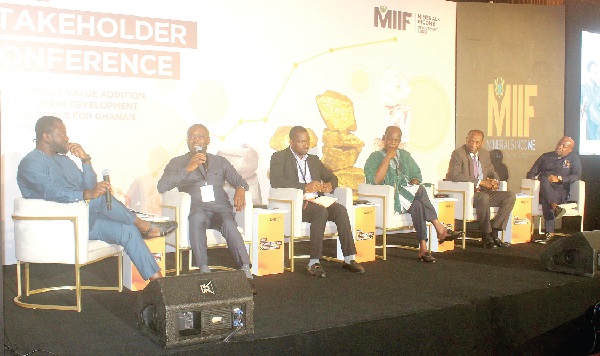MIIF Injects $950 Million into Ghana’s Economy, Supporting Gold for Oil Program
MIIF Injects $950 Million into Ghana's Economy, Supporting Gold for Oil Program

- MIIF has contributed $950 million to the Ghanaian economy
- This investment was facilitated through the MIIF Gold Trade Desk
- Dukers urged all stakeholders to support the government's efforts
The Minerals Income and Investment Fund (MIIF) has contributed $950 million to the Ghanaian economy over the past 11 months.
The fund also played a crucial role in the Gold for Oil program, providing approximately $626 million to Bulk Oil Distribution Companies (BDCs) between September 2023 and August 2024. This investment was facilitated through the MIIF Gold Trade Desk.
“I can confidently say that our actions have contributed to the relative stability of the local currency in recent times,” stated Edward Nana Yaw Koranteng, the CEO of MIIF, during the opening of a stakeholder conference in Accra last Tuesday.
Additional Investments
Koranteng highlighted that the fund has invested $40 million in Asante Gold Corporation, making it the only large-scale mine with significant Ghanaian interest since the divestiture implementation program in the 1980s. Additionally, MIIF has completed a GH¢25 million investment in Injaro Venture Capital to support the micro sub-sector of the mining industry, in line with the Government of Ghana’s local content policy.
The fund is also in the process of investing $32.9 million in lithium, supported by the government’s critical minerals policy. This includes a $5 million investment in the holding company of Atlantic Lithium and $27.9 million in local assets in Barari DV for a project expected to begin production in 2025, pending parliamentary ratification.
“Our investment in Atlantic Lithium is significant, making us the third-largest shareholder globally. If Atlantic Lithium discovers lithium in Brazil, Cote d’Ivoire, Nigeria, or Congo, MIIF will hold a major stake in that investment,” he added.
Mining Incubation Program
Looking ahead, Koranteng announced plans for a pilot phase of a revolutionary financing initiative aimed at junior gold mines in Africa. This initiative, known as the mining incubation program, is designed to assist licensed junior and small-scale mines in Ghana, promoting mercury-free and environmentally sustainable gold mining practices.
“I aim to help these miners grow into junior miners that can be listed on the Ghana Stock Exchange,” he said. The program will provide working capital, funds for mining machinery, corporate governance structures, and a traceability mechanism for small-scale miners, all underpinned by environmental, social, and governance (ESG) criteria.
Comparative Advantage
Deputy Minister of Lands and Natural Resources, Mireku Duker, emphasized that mineral endowment creates comparative advantages and can inspire development.
However, he noted that without appropriate value addition and optimized value chain development, these advantages have limitations.
He pointed out that limited access to technology in mineral-rich countries often leads to raw minerals being exported to technologically advanced countries, which then add value and market the finished products globally.
This dynamic creates inequities, disadvantaging countries like Ghana while favoring those that provide value-added services.
Duker urged all stakeholders to support the government’s efforts to add value to mineral resources before they reach the market.
Conference Overview
The conference, organized by MIIF, focused on “Minerals Value Addition and Value Chain Development: Essential Tools for Ghana’s Development.” It aimed to explore the crucial role of mineral value addition and value chain development in driving sustainable economic growth in Ghana.
By fostering deeper conversations and evidence-based actions, MIIF hopes to help Ghana transition from raw mineral exports to processing and manufacturing, ultimately maximizing the country’s mineral wealth for long-term development and improved livelihoods.





